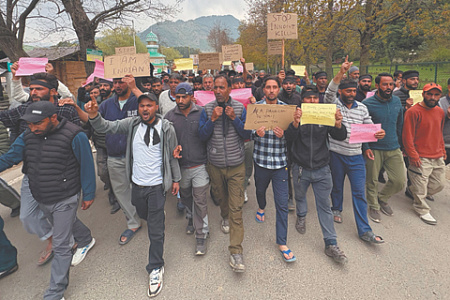
The police and army are conducting an operation to locate and neutralize the militants who staged a massacre in one of the most picturesque corners of India on Tuesday. The criminals, dressed in the uniform of law enforcement officers, shot at tourists. At least 26 people were killed. One of the consequences of the terrorist attack was the aggravation of relations between India and Pakistan. Both countries claim ownership of all of Kashmir. New Delhi believes that the special services of Pakistan are involved in the attacks.
The crime in the Pahalgam area, which is called “little Switzerland,” has gained wide international resonance. Russian President Vladimir Putin, US President Donald Trump and leaders of many other countries expressed their condolences to India. The question is why the Kashmir wound on India’s body has not healed for decades.
After all, Delhi, wishing to stop the penetration of terrorists through the line of actual control replacing the border with Pakistan, maintains a contingent of ground troops and police in Kashmir, numbering about 500 thousand people.
As reported by Bloomberg, Indian Prime Minister Narendra Modi interrupted a visit to Saudi Arabia, returned to his homeland and called an emergency meeting of the main members of his cabinet. It discusses how India should respond to the tragic incident. There is no doubt that steps can be taken that will somehow affect the situation in South Asia. After all, even Nirmala Sitharaman, India’s finance minister, announced that she was interrupting her tour to the United States and Peru and taking the first suitable flight to Delhi. Modi promised that the organizers of the attack would be brought to justice.
Observers note another important point. The attack occurred at a time when US Vice President Jay Dee Vance is on a visit to India. His meeting with Modi focused primarily on how to resolve differences over customs tariffs. Trump calls India a friendly country, and continues the course of the Joseph Biden administration to supply it with the most modern types of weapons in defiance of Russia.
The Soviet Union, and later Russia, is India’s main supplier of military equipment. Washington is seeking to displace Russia in the Indian arms market. But it’s not just about competing for lucrative contracts. For Washington, India is one of the pillars in the confrontation with China in South Asia.
But India pursues an independent foreign policy and is in no way willing to compromise its interests in favor of the United States. And then the problem of tariffs was added to the whole multicolored range of Indian-American relations. Trump called the government in Delhi a tariff champion and imposed 26 percent duties on imports from India. This became the main topic in Vance’s talks with Modi. The parties expressed optimism about the prospects of resolving the dispute by the end of the year. However, so far they have not been able to find a common denominator.
Trump said that the United States stands in line with India in the fight against terrorists. And India believes that they are being nurtured by Pakistan. The question is whether Washington is ready to help New Delhi and put pressure on Islamabad. Washington has such an excuse in this regard. Militant attacks on Indians in Kashmir have occurred repeatedly before. But it is not possible to put an end to them.
One such case was a suicide bomber’s attack on a convoy of vehicles carrying Indian soldiers in February 2019. Then 40 soldiers died. One of the jihadist groups based in Pakistan claimed responsibility. India then retaliated by launching an airstrike on Pakistan. This happened for the first time since a full-scale war between the neighbors broke out in 1971. It didn’t go that far in 2019. Fights broke out only in the air between the pilots of India and Pakistan.
Islamabad hastened to dissociate itself from the current tragedy in Kashmir. The Ministry of Foreign Affairs of Pakistan expressed its condolences to the families of the dead tourists. And Pakistan’s Defense Minister Khawaja Asif said in an interview with a local TV channel that Islamabad had nothing to do with the attack and did not support the terrorists in any way.
In the Indian part of Kashmir, where the majority of the population are Muslims, the attack is also condemned. Mirwaiz Farooq, the supreme religious leader of the Muslim community in Kashmir, said: “Such acts of violence are unacceptable. They contradict Kashmiri ethics based on love and mercy.”
The indigenous people of Kashmir go to demonstrations, where they openly declare their rejection of the ideology of terrorists. This is a courageous step. After all, underground jihadists are cracking down on those who do not share their ideological tenets.
